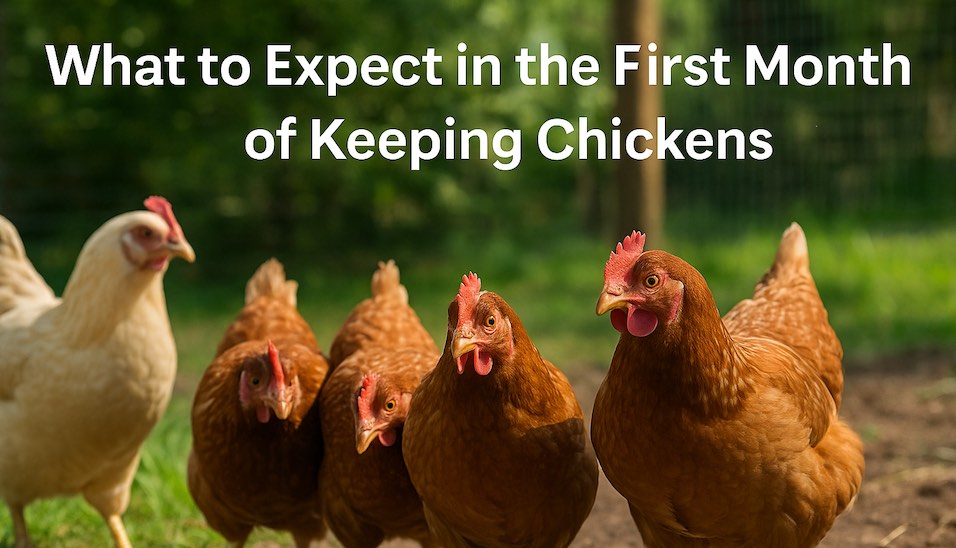How long do chickens live for?
How long do chickens live for?
The lifespan of a chicken depends on their diet and environment, but also on their breed and genetics. In particular, heritage chicken breeds live longer than commercial breeds, and egg layers live longer than meat breeds.
Chickens typically live between 5 to 10 years, depending on their breed. While some chickens can live up to 16-18 years, that is certainly an exception. If you have a chicken that old we would love to hear about it!
6 Factors That Impact Chicken Lifespan
Factors like your chickens’ diet, environment, and healthcare may impact how long they live. To learn how to extend the life of a chicken, ensure they have a balanced diet, a safe and clean living environment, and regular veterinary care.
1. Diet
A good diet is of the biggest factors in how long your chickens.
Just like us, chickens need a balanced diet to stay healthy. The most important part of a good diet is free-access to a high quality, complete layer feed in pellet or mash form. This will ensure that they are getting all the protein, vitamins and minerals that they need.
If their diet is lacking, you might see health problems pop up that can shorten their lifespan. Too many treats is a common problem that impacts health.
So, invest in high-quality feed, and limit treats to healthy options, in small amounts and only a few days a week. Fresh fruits, vegetables, and protein-rich dried mealworms are the healthiest options.
- Key Nutrients: Aim for a 16-18% protein complete feed for layers. Shell grit is crucial for layers as a source of calcium and grit.
- Pro Tip: Stick to a complete layer feed. A happy, well-fed chicken is a long-lived chicken!
2. Environment
Where your chickens live plays a huge role in how long they stick around.
A clean, spacious, and secure coop and comfy nesting box not only keeps them comfortable but also safe from predators and nasty weather. Good ventilation and regular cleaning are your best friends here to keep harmful bacteria and parasites at bay.
- Space Requirements: Read our guide on how much space chickens need.
- Moisture Control: Keep the coop dry to prevent mould and bacteria for the best health.
For laying hens, there aren’t any better options for shelter than our Australian-made nesting boxes.
3. Genetics
Genetics can be a bit of a wild card. Some chicken breeds are just tougher and live longer than others.
For example, heritage breeds usually outlive commercial breeds that are bred for rapid growth and high productivity. Layers outlive meat breeds.
- Heritage Breeds: Often live 8-10 years, sometimes longer.
- Commercial Breeds: Typically live 3-5 years.
If you’re in it for the long haul and keeping chickens as pets, go for heritage breeds. They’re hardier and generally live longer.
4. Free-Ranging vs. Confined
Letting your chickens free-range can lead to a longer, healthier life. They get to forage, dust bathe, and exercise, which reduces stress and strengthens their immune systems. However, there are risks like predators to consider.
Our Gourmet Greens foraging mix is a great option if free-ranging isn't possible in your environment.
5. Veterinary Care
Good health is key to a chicken’s long life. Vaccinations, parasite control, and prompt treatment for any illnesses will keep them in tip-top shape.
- Common Vaccinations: Include Marek's disease, Newcastle disease, and infectious bronchitis.
- Parasite Control: Regularly check for lice, mites, and worms and get the right poultry healthcare products when needed.
- Pro Tip: Find a vet who cares for chickens before there is a need. It makes a world of difference when you need urgent care.
6. Common Diseases and Health Issues
Chickens are prone to certain diseases and health issues that can impact their lifespan. Knowing what to look for and acting fast can save your chickens.
Respiratory Diseases, such as infectious bronchitis need to be looked out for. Nutritional deficiencies, like vitamin A deficiency can lead to vision problems and respiratory issues.
Keep a close eye on your flock daily. Notice any changes in behavior, droppings, or energy levels? Act quickly!
Lifespan of Different Chicken Breeds
How Long Do Hens Live vs. Roosters?
You might be wondering if there’s a big difference in lifespan between hens and roosters.
Generally, hens live around 8-10 years, while roosters might live a bit longer if they’re not stressed by fighting or other issues.
- Hens: Typically live 8-10 years.
- Roosters: Can live up to 10-12 years.
How Long Do Heritage Breeds Live?
Heritage breeds are like the old-timers of the chicken world. They’re sturdy and often live longer than their commercial counterparts.
- Lifespan: Often 8-10 years, sometimes up to 12 years.
- Popular Breeds: Rhode Island Red, Plymouth Rock, Sussex.
Heritage breeds are perfect for backyard flocks. They’re tough and adaptable.
How Long Do Commercial Breeds Live?
Commercial breeds are bred for specific purposes like egg production or meat. They often have shorter lifespans due to the intense selective breeding for productivity. Meat breeds do not live as long as layers.
- Lifespan: Typically 3-5 years.
- Popular Breeds: Leghorn (for eggs), Cornish Cross (for meat).
How Long Do Silkie Chickens Live?
Silkies are a favorite due to their fluffy appearance and gentle nature. With the right care, they can live relatively long lives.
- Lifespan: Around 7-9 years.
- Characteristics: Known for their fluffy plumage and calm temperament.
- Pro Tip: Silkies need extra care to stay dry and clean because of their unique feathers.
How Long Do Chickens Lay Eggs?
Chickens are amazing egg producers, but their peak laying years don’t last forever.
Most hens start laying eggs at around 5-6 months old. They reach their peak production at about 1-2 years old. After that, egg production gradually declines. After 2 years, expect fewer eggs each year.
Provide a comfortable nesting environment by getting a high-quality nesting box and maintain a stress-free routine to maximize egg production during their peak years.
How Long Do Chickens Live As Pets?
Keeping chickens as pets is rewarding. With proper care, pet chickens can live long, healthy lives. Here’s what you need to know about their lifespan in different environments.
Indoor vs. Outdoor Chickens
Indoor and outdoor living can affect your chickens' lifespan.
Indoor chickens generally live longer due to protection from predators and harsh weather.
Outdoor chickens benefit from natural behaviors like foraging and dust bathing but face more risks.
If you keep chickens indoors, make sure they have plenty of space and mental stimulation.
How Old Can Chickens Get?
While the average lifespan is around 8-10 years, some chickens defy the odds and live much longer.
The oldest recorded chicken lived to be over 23 years old, according to the Guinness World Records.
Keeping Your Chickens Healthy and Happy
Start each day by checking that your birds have enough food and water. Make sure they always have fresh, clean water and quality feed.
Our high-quality chicken feeders and poultry waterers help take care of this task!
Observe your chickens for any signs of illness or distress.
Spend a few minutes interacting with your chickens each day. This helps you bond with them and quickly notice any changes in behavior.
Ensuring a Long and Happy Life for Your Chickens
Taking care of chickens is a rewarding experience that brings joy and fresh eggs to your home.
Provide a balanced diet, safe environment, regular health check-ups, and social interaction, so your chickens live long, happy lives. Remember, every chicken is unique, and getting to know your flock will help you meet their individual needs.
Happy chickens make for a happy chicken keeper!




